
WHY IS IMMUNITY-BUILDING CRITICAL DURING THE MONSOON?
With the arrival of the first rain showers, the earth blooms in all its resplendent glory. For ages, this lush backdrop has been the ideal muse for most creators, artists, poets and singers. It is a season of inspiration and joy, and certainly a welcome respite after a hot and dry spell of summer.
However, just like the summer, the monsoon too can have an adverse effect on your health. The rainy season is particularly known for bringing bouts of cold, cough, fever and stomach infections. In fact, with the lockdown restrictions lifted, it’s more important now to take utmost care of your immunity.
This blog will give you a better insight into:
Why is focusing on your immunity critical during the monsoon?
How can proper self-care boost your immunity?
How to improve your agni (digestive fire)?
What Yogasanas will help build your immunity?
HOW DOES THE MONSOON AFFECT IMMUNITY?






You must have noticed that your immune system tends to be more vulnerable in the monsoon. Temperature fluctuations can weaken your white blood cells, thus reducing your resistance to diseases. Your agni (digestive fire) is also lower and eating heavy, greasy or spicy foods can trigger indigestion, bloating, acidity or nausea.
All of this makes you more susceptible to the common cold, viral infections, flu, and digestive issues in the monsoon.
So what can you do to build your immunity in this season and stay healthy?
HOW TO IMPROVE YOUR IMMUNITY IN THE MONSOON?

MAINTAINING DIGESTIVE HEALTH
The gut plays a crucial role in protecting and maintaining your body’s health and immunity. That’s why it is imperative to keep your gut healthy and ensure proper functioning of your digestive system. During the monsoon, the humidity in the air causes mand agni (weakened digestive fire), making your digestion and metabolism sluggish. You may experience a loss of appetite. Furthermore, the cravings for fried, heavy and unhealthy food makes the case even worse; giving rise to gastro-intestinal problems. The following changes are suggested for a healthy gut during the monsoon:
15 TIPS FOR BETTER DIGESTIVE HEALTH DURING THE MONSOONS:
1. Avoid Daytime Naps:

Even though a nap after lunch sounds tempting, try not to give in to these urges during the day.
What Does Ayurveda Say?
A daytime nap lowers your body’s temperature, leading to kapha vitiation and formation of aam (toxins). This further slows down your metabolism and hampers digestion. You may correlate this with heaviness and stiffness in the body and a feeling of lethargy after you wake up from an afternoon nap.
2. Choose Seasonal, Local Food:

Monsoon-specific vegetables like lauki (bottle gourd), karela (bitter gourd), tinda (Indian squash) and parwal (pointed gourd), and fruits like cherries, jamun, litchi and pomegranate are loaded with fibre, rich in immunity-boosting nutrients, and great for the digestive system.
What Does Ayurveda Say?
Nature provides exactly what our body needs to adapt to the current season and environment. Seasonal produce, which is grown locally, harvested at its peak and delivered fresh, retains its full nutrient content and a richer flavour profile. These fruits and vegetables are also highly digestible and are best suited for increasing your immunity.
3. Eat Less Carbs:

Opt for light whole grains like barley, rice or wheat in your meals.
What Does Ayurveda Say?
Since the later part of the evening is a kapha-dominated period or kapha kaal, consume foods that will help balance kapha and not aggravate it. Most grains or cereals prominently produce sugars after digestion and leave you feeling sluggish, which is why you should eat only one of the above options of carbohydrates at dinner time
4. Prefer Lentils & Sprouts:
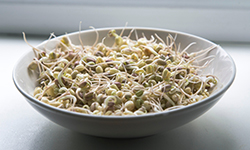
Consume lentils and green gram (moong) daily as they are a high protein source.
What Does Ayurveda Say?
Plant-based proteins are bioavailable and do not overload your digestive system. For dinner, avoid large quantities of meats or non-vegetarian foods, as they’re heavier to digest.
5. Wash & Cook Vegetables Before Eating:

Wash veggies thoroughly, and consume them in boiled, steamed, cooked or sautéed preparations to ensure that any microorganisms present are killed.
What Does Ayurveda Say?
The presence of microorganisms in unwashed, unpeeled, raw vegetables can cause stomach infections. It’s better to steam or stir-fry carrots or beetroots, instead of eating them raw in a salad.
6. Avoid Leafy Greens:

Even though green leafy vegetables and root vegetables are a good source of essential vitamins and minerals, they are heavy to digest and should be avoided during the monsoon.
What Does Ayurveda Say?
Leafy greens and root vegetables are grown in water-holding areas and thus exposed to a lot of microorganisms or contamination. These veggies also burden your weakened digestive fire, causing indigestion, bloating or an upset stomach.
7. Light Meals At Night:

For dinner, you can opt for warm soups or stews prepared from seasonal vegetables, pulses, sprouts or lean meats.
What Does Ayurveda Say?
Digestion takes place during 10 pm to 2 am which is the pitta kaal of the night. While you sleep, this process is slower as all organ systems are at rest. That is why your dinner should always be lighter than lunch. If you consume a heavy meal, it will lead to a disturbed sleep and improper digestion. Having a single bowl of soup can keep your stomach feeling full yet light throughout the night, and ensure less load on the digestive system.
8. Avoid Heavy Food Items:
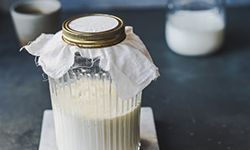
During the monsoon, avoid foods that take a longer time to digest such as curds, basundi, shrikhanda, pizzas, burgers, and heavy, spicy non-vegetarian dishes.
What Does Ayurveda Say?
Replace curds with buttermilk, which is a more digestible format. Go for clear soups and stews of boiled vegetables or soft non-vegetarian foods instead of heavy-to-digest spicy gravies and curries.
9. Eat Fresh, Hot Meals:

Since our digestive strength is weak during the monsoon, it’s important to eat freshly prepared, hot meals.
What Does Ayurveda Say?
Freshly cooked meals have a higher nutritive value and nourish the body tissues, leading to better immunity and strength. On the other hand, stale food can have a larger presence of microorganisms if not stored properly. This can cause stomach disturbances or diarrhoea. Especially avoid stale heavy-to-digest foods like milk or milk products including basundi, paneer and cream or fondant-based cakes, non-vegetarian foods, eggs, mushrooms, and soya-bean.
10. Avoid Chillies:

Even though it might make your food bland, limit the addition of green chillies, red chillies, and chilli powder to your meals.
What Does Ayurveda Say?
Vata dosha is aggravated by excess of katu rasa (spicy), tikta rasa (bitter) and kashaya rasa (astringent). Spicy foods can irritate your stomach lining and lead to indigestion, which is why you should reduce their intake. Add fresh ginger/sunthi powder or black pepper instead to increase the palatability as well as digestibility of food.
11. Ghee Is Good:

Add the goodness of pure cow’s ghee in your daily diet. It not only adds an amazing taste to food but also aids in digestion and improves gut health.
What Does Ayurveda Say?
Pure ghee enhances the digestive fire, settles vata which is provoked in the monsoon, and lubricates and nourishes body tissues and organ systems, thus providing strength and immunity.
12. Secret Stimulant:
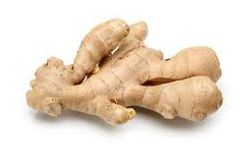
Eat a small piece of ginger with rock salt before each meal as this helps improve digestion.
What Does Ayurveda Say?
Ginger with rock salt improves your sense of taste, stimulates the secretion of digestive juices, strengthens your digestive fire, prevents indigestion, and pacifies vata.
13. Keep Cravings In Check:
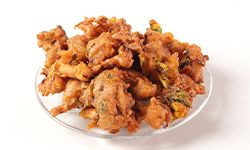
It’s natural to crave hot, savoury, fried snacks like bhajiya, pakoras and papads during cold, rainy evenings. But instead of the deep-fried version, you can try baking, grilling or using an air-fryer to make these snacks healthy.
What Does Ayurveda Say?
Fatty, oily snacks lower your digestive fire, leading to vata aggravation and indigestion. Use ghee instead of oil whenever possible, as food fried in ghee is less greasy, easier to digest and also helps lower cholesterol.
14. Boil Water:
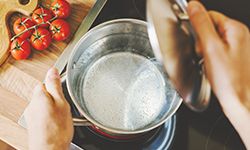
It’s advisable to filter and boil tap-water as the water available in reservoirs during monsoon is comparatively heavier to digest and there’s also a risk of microorganisms.
What Does Ayurveda Say?
The boiling process (Agni sanskar) kills microorganisms that are known to attack your digestive system and also makes water lighter which helps enhance digestive fire.
15. Stay Hydrated:

During colder seasons, you may not drink as much water as your thirst decreases. However, it’s important to keep yourself hydrated throughout the day.
What Does Ayurveda Say?
Vata is aggravated in the monsoon, and its dry nature absorbs moisture from your body tissues. Your decreased thirst and reduced intake of water can lead to low urine output, irritability or fatigue. That’s why you need to stay hydrated with plenty of water and a liquid-based diet in the form of soups, stews or porridges to support your digestion process and metabolism. Drinking lukewarm water mixed with a little honey helps keep your throat lubricated and clear, and benefits your immunity.
EXERCISE FOR BETTER HEALTH

Besides choosing healthier food habits and maintaining proper hygiene, staying physically active can also help you overcome monsoon-related ailments. There are a few easy yogasanas that will help you stay fit and healthy.
1. Pranayama:

The Sanskrit word Pranayama is derived from the words Pran meaning life or bio-energy and Ayama meaning in-control.
What Are The Benefits?
There are 3 steps in pranayama; Puraka – inhalation, Rechaka – exhalation and Kumbhaka – holding the breath. There are 8 types of pranayama and they have multiple benefits right from regulating blood pressure to improving lung capacity. During monsoon, practice Kapalbhati Pranayama as it strengthens the diaphragm and abdominal muscles.
2. Naukasana:

This asana derives its name from Nauka – boat and Asana – posture.
What Are The Benefits?
Naukasana invigorates the abdominal organs and strengthens the back and abdominal muscles.
Who Should Avoid It?
People with asthma, heart conditions and pregnant women should avoid this asana.
3. Bhujangasana:

This asana derives its name from Bhujanga – cobra and Asana – posture.
What Are The Benefits?
This asana improves blood circulation, strengthens the back & abdomen, and improves flexibility & respiratory function.
Who Should Avoid It?
People with past fractures in wrists or ribs, abdominal surgeries and ones suffering from Carpal Tunnel Syndrome should avoid this asana.
4. Setu Bandhasana:

This asana’s name is derived from Setu – bridge, Bandh – lock and Asana – posture.
What Are The Benefits?
This asana improves the digestive agni and thus stimulates digestion. It also helps in relaxing anxiety and back pain, relieves menstrual pains, and keeps high BP, asthma and sinusitis in control.
5. Svanasana:

This asana’s name is derived from Svana – dog and Asana – posture.
What Are The Benefits?
Svanasana works on the flexibility of the spinal cord, and regulates energy flow through it to unite the mind and body. Its benefits include an energised body, better lung capacity, and stress-relief.
Who Should Avoid It?
People with Carpal Tunnel Syndrome, detached retina, weak eye capillaries, and high BP should avoid this asana.
6. Basic Cardio:

Since going out for a walk may be difficult, you can spot-jog for about 20 minutes at home.
What Are The Benefits?
Cardio activities elevate the heart-rate and warm up your body. Regular cardio keeps the mind and body active and energetic, improves your lung-capacity, and strengthens your immune system.
PROPER HYGIENE & SELF-CARE
Since contamination and spread of infection is more rampant during the monsoon, it’s important to keep yourself and your surroundings clean, hygienic and dry. Here are the following self-care measures you can take:
We are born with a particular Prakruti which is the body’s natural state of being. This is determined by the three doshas – vata, pitta and kapha. Your Prakruti depends on the dominant dosha, which could be one or two out of the three doshas. The aahar (diet) and vihaar (physical activities) to boost immunity would differ depending on your Prakruti – natural body state and Vikruti – acquired state of dosha imbalance.
To find out your prakruti and know the specific varsha rutucharya for your dosha, read ‘HOW DOES THE MONSOON AFFECT EACH DOSHA – VATA, PITTA OR KAPHA?’





0 Comment
No comments found.Thank you. Your comment will be visible after an approval.
Add your comment